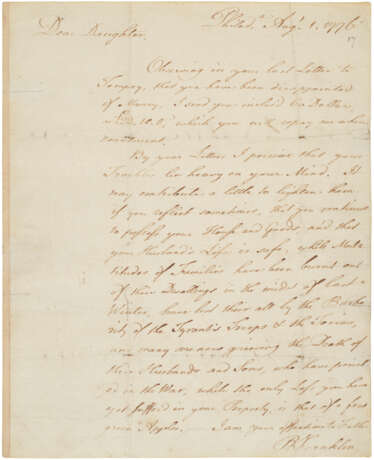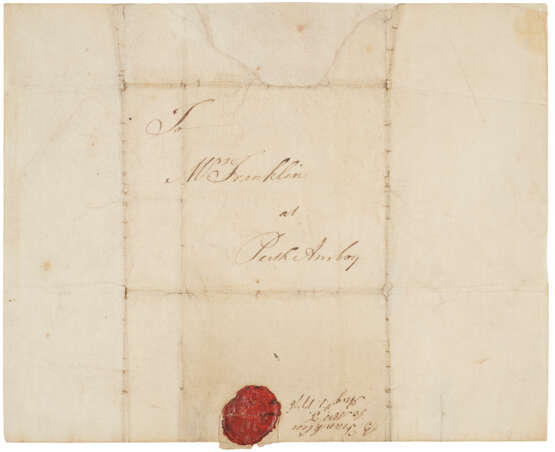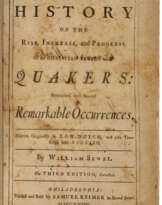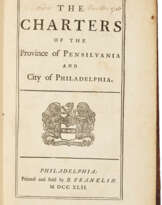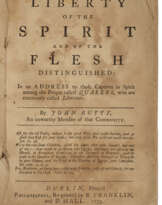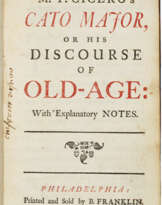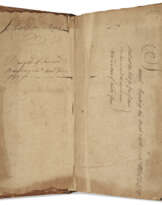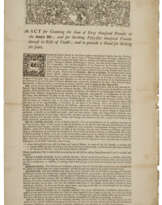ID 1362294
Los 643 | Admonishing his daughter-in-law
Schätzwert
$ 80 000 – 120 000
Benjamin Franklin, 1 August 1776
FRANKLIN, Benjamin (1706-1790). Autograph letter signed ("B Franklin") to his daughter-in-law Elizabeth Downs Franklin, Philadelphia, 1 August 1776.
One page, bifolium, 225 x 181mm, with integral transmittal leaf addressed in his hand “To Mrs. Franklin at Perth Amboy” (marginal tears repaired, a few pinholes at fold intersections, seal tear loss inflled).
The day before he signed the Declaration of Independence, Benjamin Franklin admonishes his daughter-in-law for her request for money. A remarkable letter to his daughter-in-law Elizabeth Downs, the wife of his illegitimate son, William Franklin, the Royal Governor of New Jersey, who after months under house arrest, had been taken into custody on 19 June by the New Jersey Provincial Congress. The following week, the Continental Congress ordered William imprisoned in Connecticut where he spent the next two years before being exchanged and moving to British-occupied New York City in 1778. Soon after his arrest in June 1776, Elizabeth confided to her son, William Temple Franklin as well as other relatives, of her fears, to which Franklin responded here, the day before he affixed his signature to the Declaration of Independence:
"Observing in your Letter to Tempey, that you have been disappointed of Money, I send you indos'd 60 Dollars, or £22.10.0 which you will repay when convenient. By your Letters I perceive that your Troubles lie heavy on your Mind. It may contribute a little to lighten them if you reflect sometimes, that you continued to possess your House and Goods, and that your Husband's Life is safe, while Multitudes of families have been burnt out of their Dwellings in the midst of last Winter, have lost their all by the Barbarity of the Tyrant's Troops & the Tories, and many are now grieving the Death of their Husbands and Sons, who have perished in the War, while the only Loss you have yet suffer'd in your Property is that of a few green Apples. —I am, your affectionate Father."
Six days later, Elizabeth responded, thanking Franklin for the $60, while making an appeal for her imprisoned husband: "My Troubles do Indeed lie heavy on my Mind, and tho’ many People may Suffer Still more than I do, yet that does not lessen the Weight of mine…" She suggests that Franklin use his influence to have her husband paroled, like "Many of the Officers that have been taken during the War…." She stresses that her husband's "private Affairs are unsettled, his Family Disstressd and he is living very uncomfortably, and at a great expence, which he can very illy afford at present. Consider my Dear and Honored Sir, that I am now pleading the Cause of your Son, and my Beloved Husband. If I have Said, or done anything wrong I beg to be forgiven." (Elizabeth Franklin to Benjamin Franklin, 6 August 1776, Franklin, Papers, 22:551). Elizabeth Downes Franklin moved to New York City in early 1777 when the British evacuated Perth Amboy. She died on 28 July 1777 and was buried beneath St. Paul's Chapel in New York.
William Franklin had served as Governor of New Jersey since 1763, an office bestowed upon him by Lord Bute who intended the appointment to be a reward for Benjamin's work weakening the role of the Penn Family in the affairs of Pennsylvania. His tenure as governor was largely successful, enjoying a good relationship with the legislature and was credited with popular reforms. Up until the American Revolution, Benjamin enjoyed a good relationship with his illegitimate son, who he raised as his own, and two shared high hopes for the future of the colonies as part of the British Empire. Following his father's humiliation before the Privy Council in January 1774, instead of supporting his father, William counseled him to retire from public life. In January 1775, William delivered his "Two Roads" address before the New Jersey legislature, urging the colony to remain loyal to the crown—the legislature instead passed a unanimous resolution supporting the radicals in Boston. Now on opposing sides of conflict, father and son did not communicate again until after the end of the war when they attempted reconciliation, but in the end only agreeing to forget the past. In 1785, on his return to America after eight years in France, Benjamin stopped in London for a brief and final meeting with his estranged son, and then, only to reconcile some family legal matters. The two never spoke again. Provenance: Sotheby's, New York, 23 May 1984, lot 127.
| Künstler: | Benjamin Franklin (1706 - 1790) |
|---|---|
| Kategorie: | Servicen |
| Kategorie des Auktionshauses: | Briefe, Dokumente und Manuskripte, Bücher und Handschriften |
| Künstler: | Benjamin Franklin (1706 - 1790) |
|---|---|
| Kategorie: | Servicen |
| Kategorie des Auktionshauses: | Briefe, Dokumente und Manuskripte, Bücher und Handschriften |
| Adresse der Versteigerung |
CHRISTIE'S 20 Rockefeller Plaza 10020 New York Vereinigten Staaten | ||||||||||||||
|---|---|---|---|---|---|---|---|---|---|---|---|---|---|---|---|
| Vorschau |
| ||||||||||||||
| Telefon | +1 212 636 2000 | ||||||||||||||
| Fax | +1 212 636 4930 | ||||||||||||||
| Nutzungsbedingungen | Nutzungsbedingungen | ||||||||||||||
| Versand |
Postdienst Kurierdienst Selbstabholung | ||||||||||||||
| Zahlungsarten |
Banküberweisung | ||||||||||||||
| Geschäftszeiten | Geschäftszeiten
|
